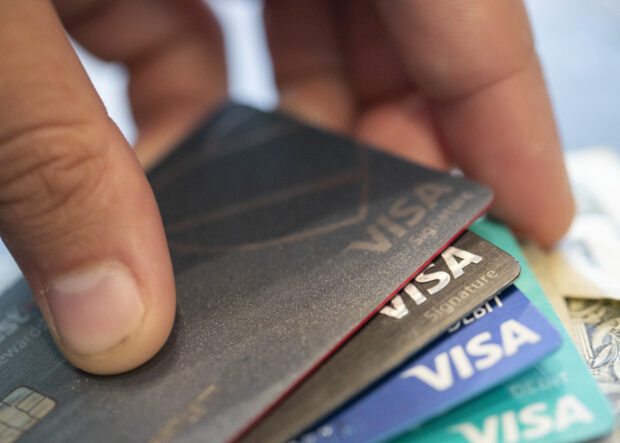Borrowers, especially the young, struggle with credit card debt

NEW YORK — Consumers are increasingly struggling to pay their credit card bills, raising concerns about severe delinquencies spiraling and sapping consumer spending.
The share of credit card debt that’s more than 90 days overdue rose to 10.7 percent during the first quarter, a 12-year high, according to the Federal Reserve Bank of New York’s report on first-quarter household debt.
A year ago severe delinquencies totaled only 8.2 percent of credit card debt. The first-quarter jump in severe delinquencies was the biggest since 2012. Meanwhile, total credit card debt rose to $1.12 trillion from just under $1 trillion a year ago.
Those in their 20s and 30s are having the most difficulty paying their credit card bills. Those age groups typically have a mix of less earnings power and lower savings.
The Federal Reserve hiked its key interest rate to a 23-year high to combat four-decade-high inflation, which peaked in June, 2022 at 9.1 percent. Those rate increases made borrowing more expensive on mortgages, auto loans, and credit cards.
READ: Despite a seemingly healthy economy, low-income spenders show the strain
Consumer spending fuels economic growth, so trouble paying credit card bills is a worrisome signal.
The direction of the labor market could determine whether debt stress becomes a bigger concern. Job and wage growth helped counter the hit to consumers’ wallets from rising inflation, but a continued slowdown or reversal there could tip the scales.
“While these indicators do not necessarily predict a recession, especially with a robust labor market, a weakening in employment conditions could exacerbate household financial instability,” said Gregory Daco, EY chief economist. “The combination of subdued job growth, sluggish income progression, and diminished savings could lead to increased delinquencies and a potential retrenchment in consumer spending.”
Retail spending stalled in April
Wall Street has so far brushed off concerns about rising credit debt levels and payment struggles, forecasting earnings growth to accelerate from 5.6 percent in the first quarter to 17.1 percent by the fourth quarter.
Still, retail spending unexpectedly stalled in April in a sign of consumer fatigue and worry. Walmart, the nation’s largest retailer, has said its customers are spending more on necessities and less on discretionary goods like home furnishings and electronics.
READ: US retail sales missed expectations in April
Coffee chain Starbucks lowered its sales expectations for the year as people visit its cafes less often, and McDonald’s is offering more deals as people cut back on fast food and eating out.
The Fed is now faced with the prospect of inflation remaining stubbornly high around 3%, above its target of 2%. The mix of high inflation, expensive borrowing rates and a slowing economy has thrown more doubt around the central bank’s ability to tame inflation without causing a recession.
Credit cards only make up about 6.5 percent of consumer debt, according to a Bank of America Global Research report. That alleviates some concerns, but the increase in delinquencies seems to be outpacing income growth. There is likely a large group of consumers who are paying their minimum balances and staying out of delinquency, but are too financially stressed to actually pay their full balances. A worsening of the economy could push those consumers into severe delinquency.
“If our forecast of a benign moderation in the labor market is correct, we think consumer spending will remain resilient,” wrote Michael Gapen, Bank of America Global Research analyst. “However, elevated credit card delinquencies among lower-income consumers could increase the sensitivity of these consumers to an adverse labor market shock.”